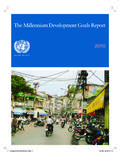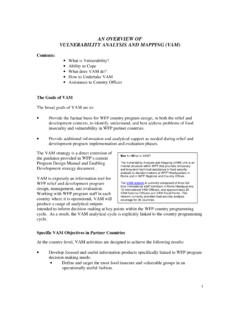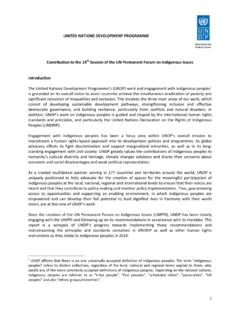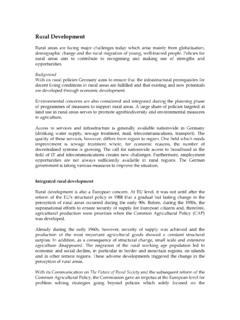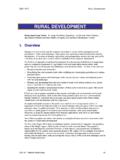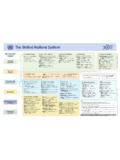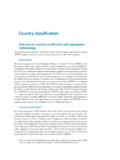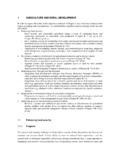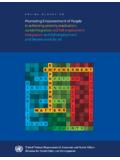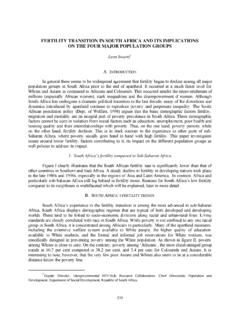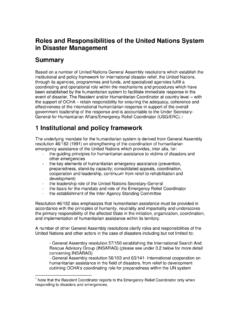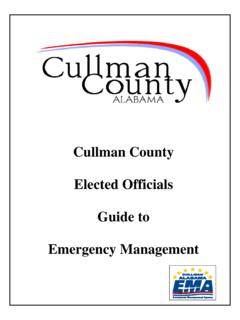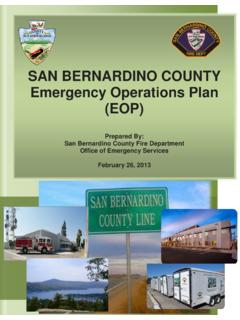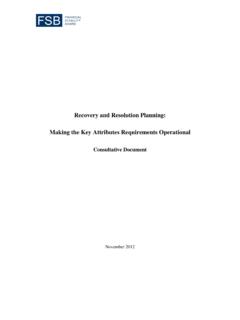Transcription of Resolution - United Nations
1 Resolution 2009/3 Strengthening of the coordination of emergency humanitarian assistance of the United Nations The Economic and Social Council, Reaffirming General Assembly Resolution 46/182 of 19 December 1991 and the guiding principles contained in the annex thereto, and recalling other relevant resolutions of the Assembly and relevant resolutions and agreed conclusions of the Economic and Social Council, Welcoming the decision of the Council to consider the theme Strengthening of the coordination of humanitarian assistance: present challenges and their impact on the future at the humanitarian affairs segment of its substantive session of 2009, Welcoming also the decision of the Council to hold panels on Respecting and implementing guiding principles of humanitarian assistance at the operational level.
2 Assisting the affected populations and Addressing the impact of current global challenges and trends on the effective delivery of humanitarian assistance , and to hold an informal event on Coordination in the transition phase between emergency relief and sustainable recovery , Expressing grave concern at the increase in the number of people affected by humanitarian emergencies, including those associated with natural hazards and complex emergencies, at the increased impact of natural disasters and at the displacement resulting from humanitarian emergencies, Reaffirming the need for all actors engaged in the provision of humanitarian assistance in situations of complex emergencies and natural disasters to promote and fully respect the principles of humanity, neutrality, impartiality and independence, Reiterating the need to mainstream a gender perspective into humanitarian assistance in a comprehensive and consistent manner, Expressing its deep concern at the increasing challenges facing Member States and the United Nations humanitarian response capacity posed by the consequences of natural disasters, including the impact of climate change, and by the humanitarian implications of the current global food crisis.
3 Acknowledging that the current financial and economic crisis has the potential to increase the need for resources for humanitarian assistance in developing countries, Condemning the increasing number of attacks and other acts of violence against humanitarian personnel, facilities, assets and supplies, and expressing deep concern about the negative implications of such attacks for the provision of humanitarian assistance to affected populations, Noting with grave concern that violence, including gender-based violence, including sexual violence, and violence against children, continues to be deliberately directed against civilian populations in many emergency situations, Recognizing that building and strengthening national and local preparedness and response capacity is critical to a more predictable and effective response, Recognizing also the clear relationship between emergency response, rehabilitation and development, and reaffirming that in order to ensure a smooth transition from relief to rehabilitation and development, emergency assistance must be provided in ways that will be supportive of recovery and long-term development and that emergency measures should be seen as a step towards sustainable development, Noting the contribution, as appropriate.
4 Of relevant regional and subregional organizations in the provision of humanitarian assistance within their region upon the request of the affected State, 1. Takes note of the report of the Secretary-General on the strengthening of the coordination of emergency humanitarian assistance of the United Nations ;1 2. Encourages Member States to create and strengthen an enabling environment for the capacity-building of their national and local authorities, national societies of the International Red Cross and Red Crescent Movement, and national and local non-governmental and community-based organizations in providing timely humanitarian assistance, and also encourages the international community, the relevant entities of the United Nations system and other relevant institutions and organizations to support national authorities in their capacity-building programmes, including through technical cooperation and long-term partnerships, based on the recognition of their important role in providing humanitarian assistance; 3.
5 Stresses that the United Nations system should make efforts to enhance existing humanitarian capacities, knowledge and institutions, including, as appropriate, through the transfer of technology and expertise to developing countries, and encourages the international community to support efforts of Member States aimed at strengthening their capacity to prepare for and respond to disasters; 4. Notes with appreciation the second session of the Global Platform for Disaster Risk Reduction, held in Geneva from 16 to 19 June 2009, and urges Member States to develop, update and strengthen disaster preparedness and risk reduction measures at all levels, in accordance with the Hyogo Framework for Action,2 in particular priority 5 thereof, taking into account their own circumstances and capacities and in coordination with relevant actors, as appropriate, and encourages the international community and relevant United Nations entities to give increased priority to supporting national and local efforts in this regard; 5.
6 Encourages Member States and, where applicable, relevant regional organizations to strengthen operational and legal frameworks for international disaster relief, taking into account, as appropriate, the Guidelines for the Domestic Facilitation and Regulation of International Disaster Relief and Initial recovery Assistance, adopted at the thirtieth International 1 A/64/84-E/2009/87. 2 Hyogo Framework for Action 2005-2015: Building the Resilience of Nations and Communities to Disasters, adopted by the World Conference on Disaster Reduction ( and , chap. I, Resolution 2). Conference of the Red Cross and Red Crescent, held in Geneva in November 2007; 6. Encourages efforts to enhance cooperation and coordination of United Nations humanitarian entities, other relevant humanitarian organizations and donor countries with the affected State, with a view to planning and delivering emergency humanitarian assistance in ways that are supportive of early recovery as well as sustainable rehabilitation and reconstruction efforts; 7.
7 Also encourages efforts to provide education in emergencies, including in order to contribute to a smooth transition from relief to development; 8. Requests the Emergency Relief Coordinator to continue his efforts to strengthen the coordination of humanitarian assistance, and encourages relevant United Nations and other relevant intergovernmental organizations, as well as other humanitarian and relevant development actors, to continue to work with the Office for the Coordination of Humanitarian Affairs of the Secretariat to enhance the coordination, effectiveness and efficiency of humanitarian assistance; 9. Encourages United Nations humanitarian organizations, while strengthening the coordination of humanitarian assistance in the field, to continue to work in close coordination with national Governments, taking into account the primary role of the affected State in the initiation, organization, coordination and implementation of such assistance within its territory; 10.
8 Welcomes the continued efforts to strengthen the humanitarian response capacity to provide a timely, predictable, coordinated and accountable response to humanitarian needs, and requests the Secretary-General to continue efforts in this regard, in consultation with Member States, including by strengthening support to United Nations resident/humanitarian coordinators and improving their identification, selection and training and by improving coordination mechanisms for the provision of humanitarian assistance at the field level; 11. Urges all actors engaged in the provision of humanitarian assistance to fully commit to and duly respect the guiding principles contained in the annex to General Assembly Resolution 46/182, including the humanitarian principles of humanity, impartiality and neutrality as well as the principle of independence, as adopted by the Assembly in its Resolution 58/114 of 17 December 2003; 12.
9 Calls upon all States and parties in complex humanitarian emergencies, in particular in armed conflict and post-conflict situations, in countries in which humanitarian personnel are operating, in conformity with the relevant provisions of international law and national laws, to cooperate fully with the United Nations and other humanitarian agencies and organizations and to ensure the safe and unhindered access of humanitarian personnel and delivery of supplies and equipment, in order to allow humanitarian personnel to perform efficiently their task of assisting affected civilian populations, including refugees and internally displaced persons; 13. Calls upon all parties to armed conflict to comply with their obligations under international humanitarian law, human rights law and refugee law; 14.
10 Calls upon all States and parties to comply fully with the provisions of international humanitarian law, including all the Geneva Conventions of 12 August 1949,3 in particular the Geneva Convention relative to the Protection of Civilian Persons in Time of War,4 in order to protect and assist civilians in occupied territories, and in this regard urges the international community and the relevant organizations of the United Nations system to strengthen humanitarian assistance to civilians in those situations; 15. Recognizes the benefits to the effectiveness of the humanitarian response of the engagement of and coordination with relevant humanitarian actors, and encourages the United Nations to continue to pursue efforts to strengthen partnerships at the global level with the International Red Cross and Red Crescent Movement, relevant humanitarian non-governmental organizations and other participants of the Inter-Agency Standing Committee; 16.
